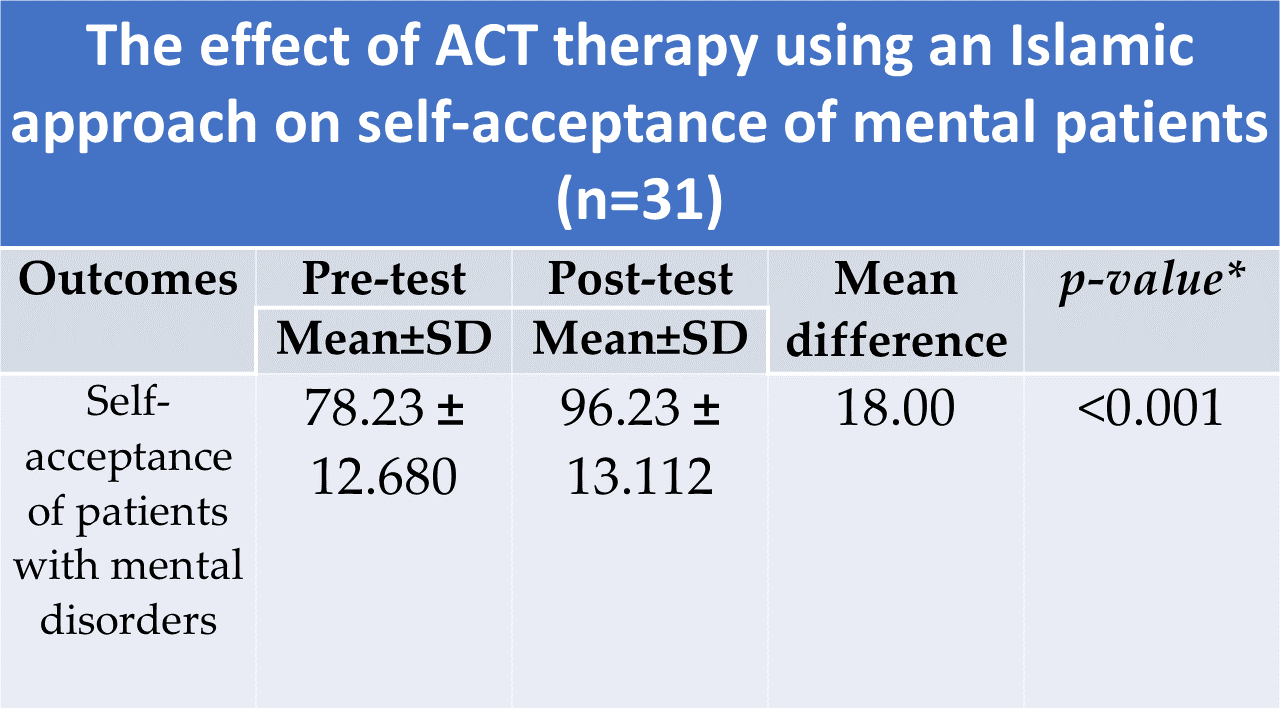The Effect of Acceptance and Commitment Therapy Islamic Approach On Self-Acceptance of Patients with Mental Disorder
DOI:
https://doi.org/10.23917/bik.v17i1.1150Keywords:
ACT, Self Acceptance, Mental disorderAbstract
Mental disorders have different manifestations and symptoms but are generally characterized by some combination of disturbances of thought, perception, emotion, behavior, and impaired relationships with other people. Severe mental disorders, including schizophrenia, are prone to stigma. Good self-acceptance has a robust negative correlation with stigma. This study examines the effect of Islamic acceptance and commitment therapy (ACT) on self-acceptance in patients with mental disorders. The research method is quantitative with a semi-experimental pre-post-test. Respondents in this study were 31 patients with mental disorders who were selected using a purposive sampling technique that met the criteria of being Muslim, awareness, and understanding of patients with mental disorders experienced in the good category, namely being aware of the disease experienced. The measuring instrument used in this study consisted of a demographic questionnaire and an Unconditional Self-Acceptance Questionnaire (USAQ). Results showed that ACT with Islamic approach significantly increased self-acceptance in a patient with mental disorders (P<0.001). ACT can be used as an effective intervention to increase self-acceptance in a patient with mental disorders.
References
Barida, M., & Widyastuti, D. A. (2019). Acceptance and Commitment Therapy (ACT) to Improve Educator's Self-Acceptance of Children with Special Needs. KONSELI : Jurnal Bimbingan Dan Konseling (E-Journal), 6(2), 117–124. https://doi.org/10.24042/kons.v6i2.4701
Chamberlain, J. M., & Haaga, D. A. F. (2001). Unconditional self-acceptance and psychological health. Journal of Rational-Emotive and Cognitive-Behavior Therapy, 19(3), 163–176. https://doi.org/10.1023/A:1011189416600
Daneshvar, M., Vakilian, K., Zadeh-Emran, A. H., & Zadeh, R. H. (2019). The Effect of ACT on Self-Esteem and Self-efficacy of Women with Breast Cancer in Iran. Current Women's Health Reviews, 16(1), 74–80. https://doi.org/10.2174/1573404815666191121150647
Davies, M. F. (2008). Irrational beliefs and unconditional self-acceptance. II. Experimental evidence for a causal link between two key features of REBT. Journal of Rational-Emotive and Cognitive-Behavior Therapy, 26(2), 89–101. https://doi.org/10.1007/s10942-007-0060-7
Ghouchani, S., Molavi, N., Massah, O., Sadeghi, M., Mousavi, S. H., Noroozi, M., Sabri, A., & Farhoudian, A. (2018). Effectiveness of Acceptance and Commitment Therapy (ACT) on aggression of patients with psychosis due to methamphetamine use: A pilot study. Journal of Substance Use, 23(4), 402–407. https://doi.org/10.1080/14659891.2018.1436602
Gul, M., & Aqeel, M. (2021). Acceptance and commitment therapy for treatment of stigma and shame in substance use disorders: a double-blind, parallel-group, randomized controlled trial. Journal of Substance Use, 26(4), 413–419. https://doi.org/10.1080/14659891.2020.1846803
Ismoyowati, T. W., & Adiyasa, P. (2021). Psychoeducation Strategy : 5(2), 87–96.
Maharjan, S., & Panthee, B. (2019). Prevalence of self-stigma and its association with self-esteem among psychiatric patients in a Nepalese teaching hospital: A cross-sectional study. BMC Psychiatry, 19(1), 1–8. https://doi.org/10.1186/s12888-019-2344-8
Permatasari, V., & Gamayanti, W. (2016). Gambaran Penerimaan Diri (Self-Acceptance) pada Orang yang Mengalami Skizofrenia. Psympathic : Jurnal Ilmiah Psikologi, 3(1), 139–152. https://doi.org/10.15575/psy.v3i1.1100
Rahayu, I. G. (2017). Mindfulness Dan Penerimaan Diri Siswa Kelas Viii Smp Nergi 1 Kawali Dan Implikasinya Terhadap Bimbingan Pribadi Dan Sosial (Studi Deskriptif Terhadap Siswa Kelas Viii Smp Negri 1 Kawali Tahun Ajaran 2016/2017). repository.upi.edu
Sayed, T. A., Ali, M. M., & Hadad, S. (2021). Risk factors and impact of stigma on psychiatric patients in Sohag. Egyptian Journal of Neurology, Psychiatry and Neurosurgery, 57(1). https://doi.org/10.1186/s41983-021-00403-3
Spidel, A., Lecomte, T., Kealy, D., & Daigneault, I. (2018). Acceptance and commitment therapy for psychosis and trauma: Improvement in psychiatric symptoms, emotion regulation, and treatment compliance following a brief group intervention. Psychology and Psychotherapy: Theory, Research, and Practice, 91(2), 248–261. https://doi.org/10.1111/papt.12159
Tesfaw, G., Kibru, B., & Ayano, G. (2020). Prevalence and factors associated with higher levels of perceived stigma among people with schizophrenia Addis Ababa, Ethiopia. International Journal of Mental Health Systems, 14(1), 1–8. https://doi.org/10.1186/s13033-020-00348-9
WHO. (2019). Mental Disorders. https://www.who.int/news-room/fact-sheets/detail/mental-disorders

Downloads
Submitted
Accepted
Published
How to Cite
Issue
Section
License
Copyright (c) 2024 Rasmawati Rasmawati, Fauziah Nur, Sri Nurjannah

This work is licensed under a Creative Commons Attribution 4.0 International License.


















